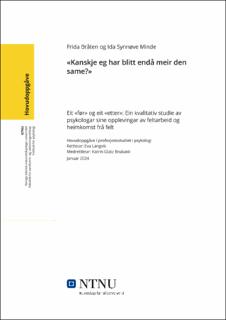| dc.contributor.advisor | Langvik, Eva | |
| dc.contributor.advisor | Brubakk, Katrin Glatz | |
| dc.contributor.author | Minde, Ida Synnøve | |
| dc.contributor.author | Bråten, Frida | |
| dc.date.accessioned | 2024-04-06T17:19:35Z | |
| dc.date.available | 2024-04-06T17:19:35Z | |
| dc.date.issued | 2024 | |
| dc.identifier | no.ntnu:inspera:155555788:27845575 | |
| dc.identifier.uri | https://hdl.handle.net/11250/3125154 | |
| dc.description.abstract | Humanitært hjelpearbeid inneber møte med tryggleiksrisiko, naud og umenneskelege forhold. Trass dette er det mange som vel å reise i felt og halde fram med feltarbeid. Det rådande paradigmet innanfor forskinga på den mentale helsa til feltarbeidarar har dei siste åra vore medisinsk retta og symptombasert. I dette paradigmet har fokus på motivasjon og psykologisk vekst blitt nedprioritert. Vidare eksisterer det avgrensa med forsking på opplevingar av heimkomst frå feltarbeid og korleis feltarbeid kan ha ein innverknad på eit personleg og profesjonelt plan. Målet med denne kvalitative studien var å ta eit steg vidare frå eit utelukkande fokus på moglege negative utfall av feltarbeid. I staden ynskte vi ei heilskapleg tilnærming ved å også undersøke moglege positive utfall, samt kva som motiverer til å halde fram med feltarbeid i møte med motgang og risiko. Studien ynskte i tillegg å rette eit søkjelys mot heimkomst frå feltarbeid, og få eit innblikk i korleis psykologar integrerer opplevingar og erfaringar frå felt inn i den personlege og profesjonelle rolla tilbake i Noreg. Vi gjennomførte semistrukturerte intervju med åtte norske psykologar som enten gjennom organisasjonar eller arbeidsplass har utøvd psykologyrket i felt. Resultata antydar at feltarbeid og heimkomst frå felt består av utfordringar, men også ei moglegheit til å snu motgang til personleg og profesjonell vekst. Sosial støtte, anerkjenning og sjølvivaretaking er sentralt både for å meistre feltoppdrag, men også for å kunne kome tilbake til Noreg med heile seg –eit «etter» beståande av sterke opplevingar og utvida perspektiv og verdssyn som må bli romma av familie, vener, kollegaer og samfunnet. Slik sett bidrar studien til ei nyansert og holistisk tilnærming til diskusjonen om stressorar i felt, meistringsstrategiar og korleis organisasjonar, før, under og etter, ikkje berre kan førebyggje negative helseutfall, men også leggje til rette for at feltarbeid kan bidra til vekst og motivasjon. | |
| dc.description.abstract | Humanitarian aid work is associated with security risks, suffering and inhumane circumstances. Despite this there are many people that choose to become humanitarian field workers. The prevailing scientific paradigm regarding studies looking at mental health among field workers have to a large extent had a medical and symptomatic view, where a focus on motivation and psychological growth has been ignored. In addition, there exists a limited body of research on the homecoming of humanitarian field workers and how field work can have an impact on the personal and professional identity. The aim of this study was to go beyond an exclusive focus on the possible negative outcomes of field work and have a holistic approach by also looking at possible positive outcomes, and the motivation to continue with field work despite adversity. Furthermore, the study wanted to shed light on the homecoming process and gain insight on how psychologists integrate their experiences from field work into their personal and professional role back in Norway. With a qualitative approach we interviewed 8 Norwegian psychologists that have practiced their profession in humanitarian field work. The results from the thematic analysis point to that humanitarian field work and returning back home includes challenges, but also an opportunity to turn adversity into both personal and professional growth. Social support, recognition and self-care are central to successfully manage the humanitarian field work, but also to return home as a whole person. An “after” that includes strong experiences and a broadened perspective and worldview that must be accepted and welcomed by family, friends, colleagues, and society. In this manner the study contributes to a nuanced and holistic approach to the discussion about stressors in field work, coping strategies and how organizations, before, during and after, not only can prevent negative health outcomes, but also facilitate and contribute to growth and motivation. | |
| dc.language | nno | |
| dc.publisher | NTNU | |
| dc.title | "Kanskje eg har blitt endå meir den same?"
Eit "før" og eit "etter": Ein kvalitativ studie av psykologar sine opplevingar av feltarbeid og heimkomst frå felt | |
| dc.type | Master thesis | |
